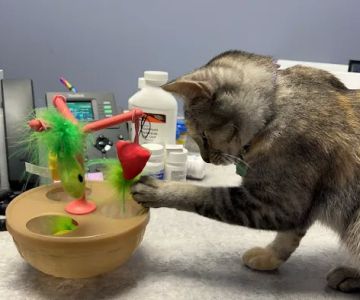- 1 - Is Your Pet Overweight? How to check effectively
- 2 - Health risks associated with pet obesity
- 3 - What to do with natural remedies and lifestyle changes
- 4 - Real-life stories of pets overcoming weight issues
- 5 - Where to find professional guidance and resources
Is Your Pet Overweight? How to check effectively
The question “Is Your Pet Overweight? How to Check and What to Do With Natural Remedies” has become more relevant than ever, especially as pet obesity continues to rise in the United States. Checking your pet’s weight goes beyond the number on the scale. Veterinarians recommend the Body Condition Score (BCS), which involves looking at your pet’s body shape and feeling for ribs, spine, and waist definition. A healthy pet should have a visible waistline when viewed from above and ribs that are easy to feel but not protruding.
For dogs, difficulty running, reluctance to climb stairs, or excessive panting can be signs of extra weight. For cats, trouble grooming or reduced agility may indicate obesity. Owners should perform regular at-home checks while scheduling professional assessments at least once a year.
Health risks associated with pet obesity
Obesity in pets can lead to serious health risks, including diabetes, arthritis, heart disease, and reduced lifespan. In fact, studies show that overweight dogs live up to two years less than those with healthy weight. Cats are also prone to fatty liver disease and urinary tract issues when carrying excess pounds.
Beyond medical problems, obesity can impact a pet’s quality of life. Simple joys like chasing a ball or jumping onto a couch become difficult. Recognizing these risks motivates owners to act early, preventing complications before they become life-threatening.

253 Hurffville - Cross Keys Rd #5b, Sewell, NJ 08080, USA
See DetailsWhat to do with natural remedies and lifestyle changes
Once you’ve identified that your pet may be overweight, the next step is making sustainable changes. Natural remedies and lifestyle adjustments can often make a significant difference:
1. Diet improvements: Switching to portion-controlled meals with high-quality, nutrient-dense ingredients helps regulate weight. Adding vegetables like green beans or carrots can provide low-calorie bulk for dogs. For cats, grain-free protein-rich foods often support healthier weight management.
2. Herbal supplements: Certain natural ingredients, such as dandelion root or fish oil, are sometimes recommended by holistic veterinarians to support metabolism and joint health. Always consult a professional before introducing supplements.
3. Regular exercise: Daily walks, interactive play, or puzzle feeders keep pets active while preventing boredom. Even short but consistent activities can burn calories and improve mobility.
4. Stress management: Stress and anxiety can lead to overeating. Creating a calm environment and maintaining a routine helps reduce unhealthy habits in pets.
Real-life stories of pets overcoming weight issues
Social media has brought attention to inspiring stories of pets who successfully lost weight. One viral case featured a 30-pound cat named Cinderblock, who became an online sensation while gradually regaining mobility through hydrotherapy and portion control. Another case involved a senior Labrador who shed 15 pounds through daily swimming sessions, improving not only his health but also his playful spirit.
These stories remind owners that with patience, consistency, and the right approach, overweight pets can enjoy vibrant, healthy lives again.
Where to find professional guidance and resources
If you’re still wondering “Is Your Pet Overweight? How to Check and What to Do With Natural Remedies”, expert advice can provide clarity. At Hidden Brook Veterinary, pet owners gain access to tailored weight management plans, nutritional counseling, and holistic approaches that focus on long-term wellness. With the right support, you can help your pet achieve a healthier lifestyle naturally and safely.











